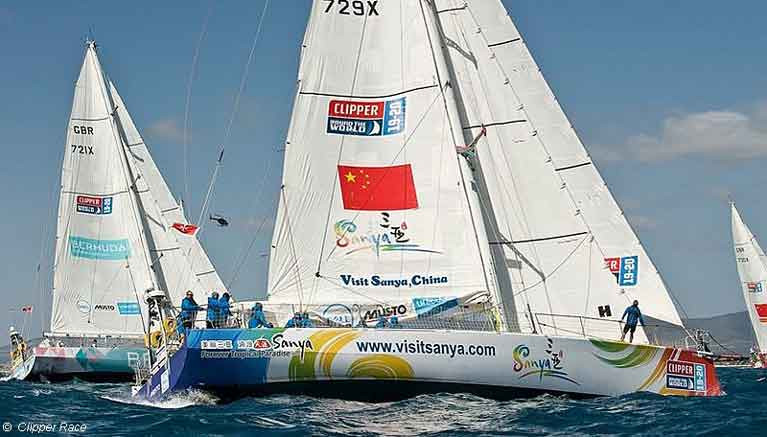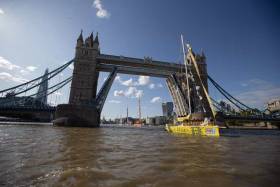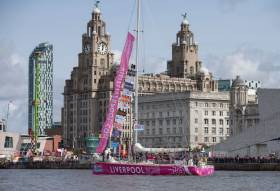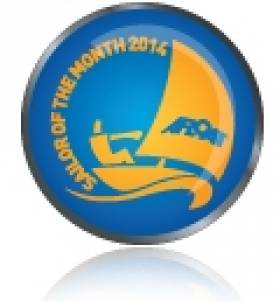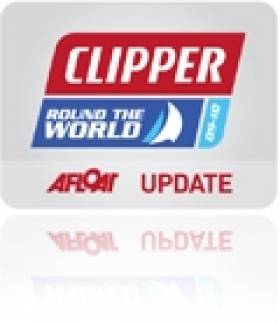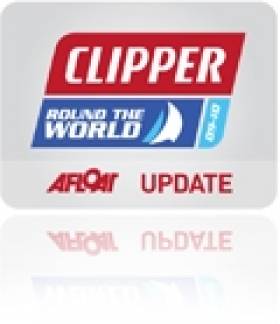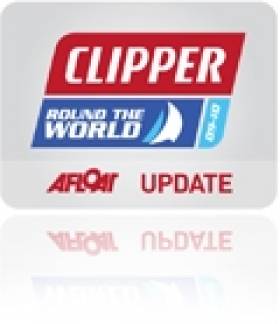Displaying items by tag: Clipper
'Perseverance' Wins First Race of Clipper Round the World Yacht Race into Puerto Sherry
Perseverance has emerged victorious in the first race of the Clipper Round the World Yacht Race, a gruelling competition that sees teams battle extreme conditions as they race over 40,000 nautical miles around the globe.
The race started on 3 September from Portsmouth, UK, and the fleet set sail for Puerto Sherry, with the eleven teams encountering challenging conditions throughout the race to Spain, requiring plenty of tactical racing.
Crew members from diverse backgrounds, including doctors, teachers, electricians, and tattoo artists, participate in the global sailing race, with many having no prior sailing experience before undertaking the intensive four-stage training programme required to race. The 2023-24 edition of the race kicked off last weekend with the fleet covering over 1000 nautical miles of the epic journey in a testing first race.
Perseverance secured the top spot in the race, followed by Yacht Club Punta del Este in second place and UNICEF in third.
Clipper Ventures Reveals New Arctic Circle Sailing Expedition
Clipper Ventures will be offering expedition sailing to Greenland from summer 2022 as it unveils its new subsidiary, SKIRR Adventures. The company has also announced exhilarating big-boat racing, including the new Knox-Johnston Cup and an experiential sailing programme as it relaunches its Clipper Events business.
Set to offer expedition voyages to some of the planet’s most powerful and remote locations - by sea and land - SKIRR Adventures will meet the growing demand for adventure and unique experiences following long periods of lockdown.
SKIRR’s debut Arctic voyage, a 4,802 nautical mile long High Latitude Expedition split into five legs, will set off from Gosport, UK, on Friday 1 July 2022 bound for Iceland and Greenland via Scotland and the Faroe Islands. The full round-trip will take eight weeks to complete and adventurers can choose one leg, combine several stages, or complete all five.
 SKIRR Adventures will meet the growing demand for adventure and unique experiences following long periods of lockdown
SKIRR Adventures will meet the growing demand for adventure and unique experiences following long periods of lockdown
Once moored, there will be a chance to explore icescapes closer to shore and guides will lead day-expeditions ashore amongst some of the most imposing yet beautiful landscapes shaped by the forces of nature.
Chris Rushton, Principal of SKIRR Adventures, said: “SKIRR Adventures brings together the pioneering spirit that runs through each of Clipper Ventures’ entities. It will offer a new, accessible way to take part in a hands-on adventure expedition whilst being guided through some of the most imposing and powerful landscapes that very few people have the opportunity to explore.”
“Due to the nature of this expedition, some previous sailing experience is required to take part - this can be Clipper Race training, RYA Day Skipper or equivalent experience - however, training will be available to book in advance of the expedition, to those who are new to sailing.”
 Experiential Sailing - sailing to Greenland
Experiential Sailing - sailing to Greenland
Clipper Events, sister company to Clipper Round the World Yacht Race, has re-invented its offering focusing on three new pillars; Experiential Sailing, Bespoke Events and an exhilarating Iconic Races big-boat racing programme, including a new sailing race, the Knox-Johnston Cup.
Says Laura Ayres, Clipper Ventures Head of Events and Partnerships: “This is a fresh start for Clipper Events, with a clear focus on experiences that draw on our heritage and expertise.
“In response to a post-pandemic desire for adventure, outdoor experiences and the corporate world’s need to reconnect with colleagues and clients, we have relaunched our Clipper Events programme. Taking part in big-boat racing, we’ll be offering competitive sailing action, giving access to iconic races, on board our own yachts. And with a 25 year history of introducing people to sailing for the first time, our experiential events, far removed from the workplace, will re-engage employees, bolster confidence, identify potential and develop leadership.
 Clipper Ventures is the organiser of the Clipper Round The World Yacht Race
Clipper Ventures is the organiser of the Clipper Round The World Yacht Race
The new Iconic Races programme enables teams and individuals to compete in world-renowned offshore races, lining up against some of the leading names in sailing, on board the purpose-built racing fleets of 68 and 70-foot yachts.
In addition to a jam-packed schedule of Round The Island Race 2022, Sevenstar Round Britain and Ireland 2022 and RORC Fastnet 2023, the Iconic Races calendar will also include the Knox-Johnston Cup. The event, named in honour of Clipper Race Founder, Sir Robin Knox-Johnston, will see teams race around the Isle of Wight with the added tactical racing features of the Clipper Race.
Clipper Events’ new Experiential Sailing programme focuses on reinvigorating professional leadership and development days, allowing guests to explore boundaries, take measured risks and develop team building whilst cementing relationships and forging new connections.
Under the guidance of a highly experienced professional skipper and first mate, the objective led programmes cater for teams of up to twelve per yacht to enjoy memorable corporate days like no other.
Bespoke Events open up the exhilaration of sailing on board an ocean racing yacht - for a day, a weekend, in a regatta, or private event. From industry regattas, educational, environmental or social programmes to TV filming and private charters, the experienced Clipper Events team is on hand to build a responsive, tailored solution.
Clipper Ventures is the organiser of the Clipper Round The World Yacht Race. It’s 2019-20 edition was suspended in 2020 due Covid-19 but will be restarting from Subic Bay, Philippines in March 2022.
Dublin Bay Sailor David FitzPatrick Joins Clipper Round the World Race for Demanding Stage South of Australia
Round the World Clipper Race contender Visit Sanya China will be in catch-up mode when she starts the Australian coastal stage (leg 4) on Christmas Day from Fremantle on the west coast to the Whitsundays on the northeast Great Barrier Reef coastline. Together with two other boats – Punta del Este and UNICEF – Sanya is starting with a three-day gap on the rest of the 11-boat fleet, having been delayed by a collision in Capetown with Punta del Este at the start of the leg to Australia.
Dublin Bay Sigma 33 sailor and noted offshore contender David FitzPatrick is joining Sanya for the first time for this leg, and he will also be aboard for the final stage. As the race to the Whitsundays will be based on elapsed time from actual starting time, Sanya is back in the hunt on a particularly challenging stage which takes the fleet into the Southern Ocean.
Clipper Round the World Race Departs London
Some 220 ordinary people from all walks of life, representing 29 different nationalities, have departed St. Katharine Docks, London, in front of thousands of spectators, to embark on the twelfth edition of the epic 40,000 nautical mile global sailing challenge, the Clipper Round the World Yacht Race.
The Clipper Race is unique in that it trains everyday people to sail around the world. And 40 per cent of participants have no sailing experience before signing up for the four weeks of intensive training needed to take part. In this edition, there are over 350 different occupations including doctors, farmers, teachers, retirees and a safari leader.
After leaving London on Sunday afternoon, the race will officially begin from the Thames Estuary today (Monday 2 September). The first race is to the Algarve town of Portimão, Portugal, then the teams will race thirty days to Punta del Este, Uruguay.
Legendary sailor and Clipper Race Chairman, Sir Robin Knox-Johnston, who was there to see the fleet off, said: “The Clipper Race is for anyone wanting to do something extraordinary with their lives. By the end of this challenge, you see crew standing tall, their self-confidence having grown, knowing they’ve done something very special with their lives.”
Sir Robin, the first person to sail solo, non-stop, around the planet, 50 years ago, founded the race to allow anyone, regardless of experience, the chance to share his passion for ocean racing. He added: “Why paint your life in pastel shades? Paint it in bright colours and enjoy every moment of it!”
Nearly 700 non-professional crew will take on Mother Nature in this ultimate ocean challenge. 43 different nationalities are represented, making it the most international edition to date. The race will see crew from Tanzania, Nigeria, Morocco, Martinique, Saudi Arabia, Slovakia and Egypt compete for the first time.
Timothy Morgan a nineteen year old student from Northamptonshire, is sailing around the world on the Seattle team. He says: “The adventure, getting away from it all and doing something completely different from everyday life, is what attracted me to the Clipper Race. I’m taking a gap year from university and when I come back people tell me I will have a whole new outlook on life.
As he departed London, he said: “Now looking around us there are crowds, three or four people deep, all the way around. It’s an emotional day leaving everyone. I won’t see my parents for six months now, but I am excited to get started.”
The race is open to anyone aged 18 and over with no upper age limit, who has a thirst for adventure and a desire to challenge themselves. The oldest competitor to date is 76, a figure matched during this edition. Each crew is led by a professional Skipper and First Mate.
Eleven teams are competing in the race, including Bermuda’s debut team, GoToBermuda, the first Uruguayan team entry, Punta del Este, plus a Unicef entry, representing the race’s Charity Partner. For the first time there are three Chinese team entries, Zhuhai, Visit Sanya, China, and Qingdao.
Following their stopover in Portimão, Portugal, the teams will then head to Punta del Este, Uruguay, Cape Town, South Africa, Fremantle and the Whitsundays, Australia, Sanya, Zhuhai and Qingdao, China, Seattle, USA, Panama and New York, USA, Bermuda, before a final crossing of the Atlantic Ocean towards Derry-Londonderry, Northern Ireland.
The Clipper Race will return to London almost a year later for Race Finish on Saturday 8 August 2020, where one of the eleven teams will be awarded the illustrious Clipper Race trophy.
Clipper Round the World Race Starts off Liverpool
The 40,000 nautical mile Clipper Round the World Yacht Race started on the Irish Sea this afternoon. The race is the only event which trains non-professional sailors to complete a circumnavigation, and is one of the toughest endurance challenges on the planet.
The first of the race’s 13 stages will take the twelve teams 6,400 nautical miles to Punta del Este in Uruguay.
The teams will return to Liverpool almost a year later on July 28, July 2018.
Conall Morrison, 35, from Derry-Londonderry, Northern Ireland, has been named as one of the twelve professional Skippers who will lead a team in the next edition of the Clipper Round the World Yacht Race. It adds yet another Irish dimenson to the race with the north coast city confirming this week it will be part a host city for the fourth consecutive race. It also follows last December's news that the former Skipper Of the Irish entry, Mark Light has been named as Clipper Race Director.
The Northern Irishman, who began sailing at age eleven on Lough Swilly and has watched the Clipper Race fleet arrive into Derry-Londonderry for all previous three editions, is relishing the upcoming mental and physical challenge. He says: “It’s always been a dream of mine to circumnavigate the globe.
“I’ve had many memorable experiences on the water, from sailing to kayaking, to surf lifesaving, but nothing that comes close to the feeling of competing in the Clipper Race. I feel my background in both racing and sailing instruction will help my team to gel and become better ocean racers.”
Conall is the second Skipper selected from the region, after Sean McCarter, who led the Derry~Londonderry~Doire team to a fifth-place finish in the Clipper 2013-14 Race.
“Being from Derry-Londonderry, I know exactly what the race means to the city. I was on the banks of the Foyle to see the fleet arrive in 2016 and it’s great to hear the Clipper Race will return to my home city next year. Sailing into Derry-Londonderry will be the proudest day in my whole career!”
Founded in 1996 by William Ward and Sir Robin Knox-Johnston, the first person to sail solo, non-stop around the world, the Clipper Race is the only event which allows amateurs the opportunity to become ocean racers and face Mother Nature in the most remote locations on the planet.
Speaking on the Skipper selection process, Sir Robin said: “The role of Clipper Race Skipper is one of the toughest, but most rewarding jobs that exists in sailing. Not only do you have to be a highly capable sailor to be able to complete the relentless challenge of circumnavigation, you also have to be an excellent instructor and leader.
“I wish Conall and his team the best in their Clipper 2017-18 Race campaign and as ever we look forward to returning to Derry-Londonderry in 2018.”
Conall was previously the Skipper of Tectona for the ‘Voyage of Recovery’ in 2012, a twelve-week voyage around Britain to assist adults in recovery from drug and alcohol addiction.
The Morrison family is no stranger to global competition, as Conall explains: “My sister Aileen is a professional athlete [competed in the triathlon in the London 2012 Olympic Games] and my other sister Ruth was an Irish swimming champion. I admire their dedication and drive, and now it is my turn to make them proud!”
The eleventh edition of this unique biennial ocean race will visit six continents and include six ocean crossings. Almost 5000 novices have been turned into ocean racers throughout the past twenty years of the Clipper Race, though still more people have climbed Mount Everest than circumnavigated the globe.
The twelve Clipper Race teams compete on the world’s largest matched fleet of 70-foot ocean racing yachts. Crew come from all walks of life and from all around the world, with over 40 different nationalities represented. Crew can complete the full circumnavigation, or one or more of the eight legs that make up the Clipper Race.
The next major event in the race preparations is Crew Allocation, at Portsmouth Guildhall, May 20, where all Skippers and crew will be assigned to their teams for the first time.
The Clipper 2017-18 Race will begin in the UK this summer and return almost a year later, once again including a stopover in Derry-Londonderry in summer 2018. The team with the highest total points at the finish wins the Clipper Race Trophy
Sean McCarter is Sailor of the Month for January
#sailorofthemonth – Sean McCarter of Lough Swilly Yacht Club is Sailor of the Month for January after some very successful skippering of the Irish entry Derry/Londonderry/Doire in the current Clipper Round the World Race.
With this latest edition's major breakthrough in having the Tony Castro-designed 70ft Clippers included in the classic annual Rolex Sydney-Hobart Race as part of the fleet, and as a class in their own right, the 31-year-old McCarter's skills as a racing skipper, honed from a very early age on Lough Swilly, became evident as he sailed his boat to a four hour class victory in the challenging race to Hobart.
He then showed that this much-improved form was no flash in the pan by placing second in the Clipper race's next leg, Hobart to Brisbane. And in the current very long stage, from Brisbane to Singapore, DLDD has spent most of the race in the top three, sometimes in the lead. But the extreme flukiness of sailing conditions in the final stages to Singapore means that the finishing placings are open to sudden change.
But when the breezes have been strong, the Donegal sailor has come into his own, making him a clearcut winner of our latest Afloat.ie "Sailor of the Month" rankings.
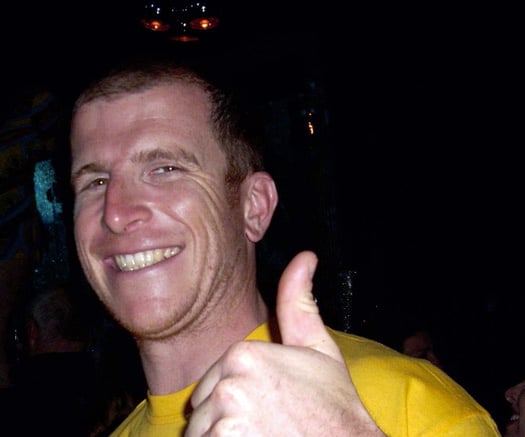
Ready to party – Sean McCarter on shore leave from DLDD. Photo: Clodagh Whelan
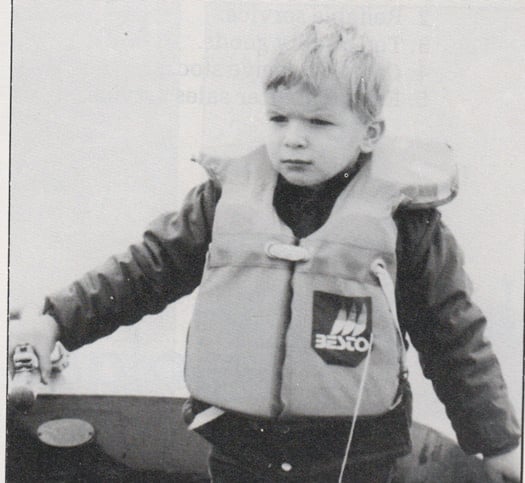
Ready to sail – Sean McCarter aged 4 at the helm in Lough Swilly
#clipper – Derry~Londonderry~Doire has won its second podium position in a row, coming in second in Race 7 of the Clipper Round the World Yacht Race from Hobart to Brisbane to complete the Australian leg.
With some very tough racing and the equivalent of three Sydney to Hobart races in as many weeks, the Northern Irish yacht has now completed half of the eight-stage round the world ocean odyssey.
After leading the fleet for the majority of the race, Derry~Londonderry~Doire was overtaken in the closing stages by Switzerland and crossed the finish line at 8:59:53pm local time, 10:59:53 UTC, 32 minutes behind winners Switzerland and ahead of OneDLL in third.
It was the second podium position for the team after victory in the prestigious Sydney to Hobart Race on 30 December.
Skipper Sean McCarter said: “After six days of full on racing we are delighted to have obtained our second podium finish of the race so far. We gave it our all to get over the line ahead of Switzerland and I am extremely proud of the crew for pushing themselves to the max.
“The addition of OneDLL hot on our tails also added to the nail-biting finish, as they grabbed third position over the line. Hats off to their team and thanks for putting your foot down to keep us going!
“We talked about keeping the momentum going and thankfully managed to do it. We were leading a lot of the way and dropped a little bit at the end but it wasn't for the want of trying.”
Mayor of Derry Londonderry, Cllr Martin Reilly congratulated the team and said: “Congratulations and best wishes to Sean and the team. Everyone is very proud of their achievement. It is a fantastic start to 2014 and may their Legenderry winning form continue!”
Clipper Festival Ends with a Splash in Derry
#ClipperAfter nine days of activities, exhibitions and concerts the Clipper Festival draws to a close today but not before an array of water based displays and boat tours and visits.
Today the River Foyle will be at its busiest yet with boat tours, ship visits, racing and jet skis with a variety to whet everyone's appetite.
Before the stunning Earl of Pembroke Tall Ship set sails at 9:30pm this evening it will be open for public viewing 10:00am-5.30pm while the impressive naval vessels lining the quay will be open from 10:00am – 1:00pm and 2:00pm – 4:00pm.
Boat tours for the Maid of Antrim and the Wee Blue Boat will be taking place from the Marine Event Pontoon throughout the day and the RNLI Seth Bell, one of the largest lifeboats in the RNLI fleet, will be open for public viewing. Opening times are from 10:00am – 5:00pm.
Experience Derry~Londonderry's first ever Zap Cat Grand Prix as these small and speedy catamarans will make you dizzy with their high octane performance. They guarantee a high octane fuelled show that's not to be missed. Racing starts at 11:00am and concludes with a prize giving ceremony at 3:00pm.
Look out for a display of speed defying stunts and tricks from some of the top water sports experts in the world. The shows feature 'Edge Water Sports' (water-skiing and wakeboarding) and Freestyle jetski displays taking place from 4:00pm – 6:00pm and includes a show every 15 minutes. The shows will be set to live commentary and film footage taken from the water will be relayed to the quayside screens.
The Continental Market and Creativity Zones will also continue throughout the day from 11:00am– 6:00pm.
Come and enjoy a spectacular farewell to a Legenderry Clipper Homecoming Festival that has seen record numbers visit Derry~Londonderry.
A Park 'n' Ride service will be available today, from 1pm – 6pm every 20 minutes taking you to where all the fun and events are located on the Quay. Pick-up/Drop off points will be at Templemore Sports complex, going to Sainsbury's Strand Road, and return. Event Park n'Stride is available at Magee College, event car parking is also available in all city centre car parks.
The 'Clipper Connection Route shuttle service', will operate from 11am – 7pm every 15 minutes today. Pick-up/Drop-off route: Foyle Street - The Diamond - Orchard Street - Strand Road - Back of the Quay (bus lay-by opposite Quay West restaurant) - Foyle Street
The Clipper 11-12 Maritime and Home Coming Festival is organised by Derry City Council in partnership with Londonderry Port. It is supported by Northern Ireland Tourist Board, MalinWaters as part of the Sail West Project marine tourism initiative, part financed by the European Union's European Regional Development Fund through INTERREG IVA Cross-Border Programme, Invest Northern Ireland, Loughs Agency, Ilex URC, FG Wilson, Diageo and event partners Translink.
#clipper – Crossing the finish line off Greencastle on the north Irish coast at 0237 GMT this morning, Gold Coast Australia secured its eleventh win in the Clipper 11-12 Round the World Yacht Race after a 2,350 mile tough upwind battle across the North Atlantic.
In the early hours of the morning the Australian entry made its way from the finish line at Greencastle, County Donegal, through Lough Foyle before arriving into Derry-Londonderry in Northern Ireland this morning where hundreds of spectators awaited them.
Upon arrival, Tasmanian skipper, Richard Hewson said, "The worst part for us as a team was the lack of sleep and we didn't see sunshine for about two weeks. It was all worth it though as we had head winds behind us the whole way up here and before we knew it we were in Northern Ireland being welcomed by a flotilla of ships. Incredible!"
Reflecting on the tough conditions of the North Atlantic, Richard continued, "As tropical storm 'Chris' developed, the tough conditions really tried to batter the fleet, but I saw it as an opportunity for us to take advantage of the strong winds and head to the south. Once we managed that, we put the kite up and we were flying along ahead of the rest of the fleet, especially those who chose to go to the north. "
Singapore is expected to finish in the next few hours, with the rest of the fleet still fighting the final miles to secure the best possible finish in this tough final ocean crossing.
Despite bad luck early on in the race, diverting to gain medical attention for an injured crew member, Qingdao managed to win the Ocean Sprint overnight, subject to verification by the Race Committee. The Chinese entry completed the sprint in 11 hours 38 minutes 09 seconds, beating De Lage Landen's time by just under 20 minutes, securing them a vital additional point.
Welcome to Yorkshire currently remains in third place, while Geraldton Western Australia played its 24 hour Stealth Mode card at midnight, in a final tactical battle, hiding from its competitors until midnight tonight.
The rest of the fleet is expected in Derry-Londonderry over the weekend with the final yacht arrival expected Monday afternoon.


























